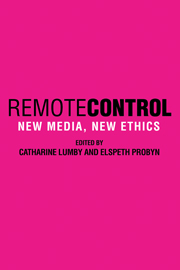Book contents
- Frontmatter
- Contents
- List of Contributors
- Acknowledgements
- 1 Introduction: An Ethics of Engagement
- 2 Real Appeal: The Ethics of Reality TV
- 3 Arguing about Ethics
- 4 ‘Their own media in their own language’
- Beyond the Disconnect: Practical Ethics
- 5 A Viable Ethics: Journalists and the ‘Ethnic Question’
- 6 Ethics, Entertainment and the Tabloid: The Case of Talkback Radio in Australia
- Money versus Ethics
- 7 Eating into Ethics: Passion, Food and Journalism
- Beyond Food Porn
- 8 Ethics impossible? Advertising and the Infomercial
- Pitching to the ‘Tribes’: New Ad Techniques
- 9 Diary of a Webdiarist: Ethics Goes Online
- 10 Control-SHIFT: Censorship and the Internet
- Representing the Asylum Seekers
- 11 The Ethics of Porn on the Net
- Ethics and Sex
- 12 Grassroots Ethics: The Case of Souths versus News Corporation
- 13 Great Pretenders: Ethics and the Rise of Pranksterism
- The Limits of Satire
- Index
Beyond Food Porn
Published online by Cambridge University Press: 18 December 2009
- Frontmatter
- Contents
- List of Contributors
- Acknowledgements
- 1 Introduction: An Ethics of Engagement
- 2 Real Appeal: The Ethics of Reality TV
- 3 Arguing about Ethics
- 4 ‘Their own media in their own language’
- Beyond the Disconnect: Practical Ethics
- 5 A Viable Ethics: Journalists and the ‘Ethnic Question’
- 6 Ethics, Entertainment and the Tabloid: The Case of Talkback Radio in Australia
- Money versus Ethics
- 7 Eating into Ethics: Passion, Food and Journalism
- Beyond Food Porn
- 8 Ethics impossible? Advertising and the Infomercial
- Pitching to the ‘Tribes’: New Ad Techniques
- 9 Diary of a Webdiarist: Ethics Goes Online
- 10 Control-SHIFT: Censorship and the Internet
- Representing the Asylum Seekers
- 11 The Ethics of Porn on the Net
- Ethics and Sex
- 12 Grassroots Ethics: The Case of Souths versus News Corporation
- 13 Great Pretenders: Ethics and the Rise of Pranksterism
- The Limits of Satire
- Index
Summary
Given your experience over a number of years and across different media genres, what do you think is the most important ethical point for you as a journalist?
Due to the comparatively low circulation figures of our newspapers and magazines by international standards, because our population is so small, it's rare for journalists or people working in the media to be forbidden from taking freebies, whether it's international travel or just being bombarded with inducements, or new products, or being invited to free meals, new restaurants or product launches by PR companies. It has become widespread practice in this country. Newspapers don't have the budgets to be able to insist that journalists pay for – or claim expenses for – many of the things, which in other countries at the quality end of journalism are forbidden.
I always try, if I've ever received a freebie, to declare it in a ‘go last’, so you know that ‘Cherry Ripe was a guest of …’. But twelve years ago it was very rare to see such declarations of interest at the bottom of an article, and it is still not universal practice.
For instance, the ABC food magazine recently ran a ten-page spread on Spain without mentioning that the author had visited Spain as a guest of the Spanish government. But it is actually one of the tenets of the journalists' code of ethics: ‘Do not allow any payment or gift or other advantage to undermine accuracy, fairness and independence. Where relevant, disclose.’
- Type
- Chapter
- Information
- Remote ControlNew Media, New Ethics, pp. 124 - 132Publisher: Cambridge University PressPrint publication year: 2003



